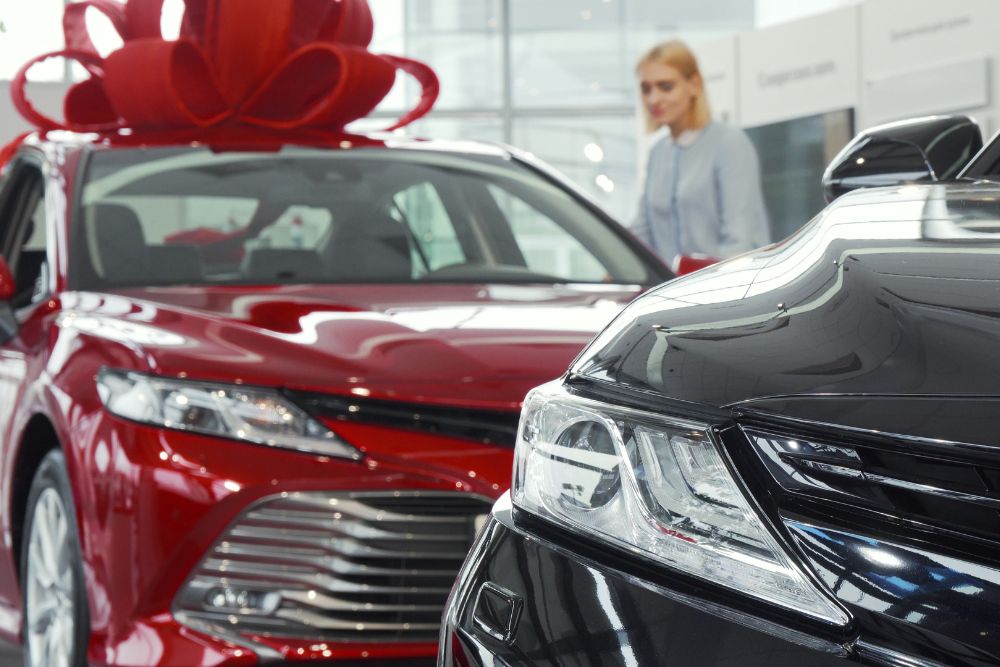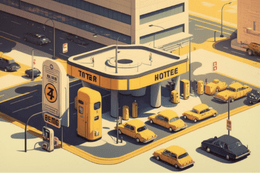Alongside buying a home, purchasing a new vehicle is one of the most extensive financial commitments a person can make. There are heavy costs associated with buying a new car that you must be prepared for, such as down payment, auto loan, monthly insurance, repairs, and weekly gas, which prices only seem to be on the rise. Despite it all, for many individuals, having a vehicle to get from point A to B is non-negotiable.

Are you wondering what’s best between buying or leasing your new vehicle? Ike many, you probably want to make the most cost-effective decision. Below, we’ve prepared a list of pros and cons that you can consider prior to signing your name on a contract.
Purchasing a New Car
There’s a process to buying a new car, and it’s far from new.
“One option for financing a vehicle is to secure a bank loan,” said Vincent Ross, sale manager at Capital Ford. “This type of loan allows you to purchase the car outright and then repay the loan amount in monthly installments. Keep in mind that while you’ll be responsible for making these payments, you’ll own the car outright and have the freedom to do as you please with it.”
Let’s consider the advantages and disadvantages of buying a new car:
Pros:
- First of all, you own the vehicle, and, therefore, all monthly payments are directly related to the actual ownership of the car. Worrying about unexpected or extra fees will be a thing of the past because costs are upfront upon agreement and signing to buy.
- Purchasing your own car allows for a greater range of choices in terms of vehicle model, transmission type, color and much more. In other words, you get to customize the vehicle you’re buying to your liking.
- Resale value is also a benefit when purchasing and owning your car. With the right color and options, you can choose a vehicle that keeps a high value, allowing you to sell it or trade it at any given moment. It may even net you a little pocket cash if you know what you’re doing!
- Owning a vehicle also means keeping it for as long as you wish. You can modify the vehicle and have reparations done on the car because you are the sole owner. A leased vehicle doesn’t come with these freedoms.
Cons:
- Payments will most likely be higher than when leasing a car. You need to take into consideration the fees for interest rates and other factors.
- Losing value is a common problem when buying your own vehicle.
“It’s important to keep in mind that the value of a vehicle can depreciate quickly, especially if it takes a while to sell or trade it in,” said Ross. “Depending on the current market and other factors, you may not get as much money back as you had hoped, especially if the vehicle has lost value over time.”
When you break it down, purchasing a car is far from complicated. You repay a monthly loan and you’re the owner of the vehicle. In many cases, the pros outweigh the cons.
Leasing a New Car
In terms of simplicity, leasing a car is somewhat more complicated than just buying one. Much like owning a car, you continue to pay the vehicle monthly, just the car isn’t yours to own. Simply put, your car is rented. At the end of your lease, you may or may not have the option to buy the car, but in most cases, people just hand them back to the dealership and lease something else.
In fact, leasing vehicles has become more and more common in recent years. Over the last five years, the market has increased by an impressive 91%[1]. Let’s take a look at the pros and cons of leasing a new car:
Pros:
- You can expect affordable payments when leasing a car, especially when directly compared to buying one. There are fewer factors to take into consideration financially when leasing a car: the vehicle’s reduction in value, interest, taxes and fees. In terms of down payment[2], lease agreements are often cheaper too, and in some cases, completely non-existent!
- You still have access to different options when leasing a car, such as changing the vehicle every 2 or 3 years. In other words, you can always be sitting in the latest and greatest model while enjoying all the most recent features. If you sign on to a shorter lease agreement, it saves you from worrying about warranties and repairs.
- A lease agreement is burden-free! No worrying about trading, selling or anything else, all you have to do is bring it back to where it came from.
“Leasing a vehicle can be a good option for those who aren’t ready to commit to owning a car or who prefer a shorter-term contract,” said Ross. “Leasing allows you to drive a new vehicle without the long-term commitment of purchasing it, and you’ll have the flexibility to switch to a different car or end the lease when it’s up.”
Cons:
- There might just be a catch to your lower monthly payments. A lease limit determines how much you can actually drive a vehicle, and it isn’t uncommon for dealership’s lease limits[3] to only allow 10-15,000 miles[4] a year! In other words, depending on what you actually plan on doing with your car, you might be pretty limited. You’ll also have to pay extra fees per mile you drive over that set limit which might become costly and stressful.
- There may even be costs to leasing a vehicle that you might be completely unaware of. Have you ever heard about gap insurance? Although it isn’t obligatory, it is most definitely recommended in the case something happens to the vehicle. For example, if the car is totalled, you might have to pay the remaining balance out of pocket. If you don’t have thousands of extra dollars laying around, gap insurance is important to have because it’ll cover those unexpected costs for you, but it’s also an added monthly fee.
“If you’re leasing a vehicle, you may be responsible for any physical damage that occurs during the lease period,” Ross said. “This includes dents, scratches, and interior faults. If the vehicle is returned with any of these types of damage, you may be charged additional fees.”
Renting or Leasing? Your Lifestyle Matters
When it comes to buying or leasing a new vehicle, it’s important you take your time and consider your options. Take the time to look at each situation’s pros and cons, and the right decision will be easier to make.
Most commonly, dealerships offer both leasing and buying options. Don’t wait until you’re in front of an agent to make your decision, be well informed on your needs and do your research on several different locations before taking an appointment. Some deals are more worthwhile than others!
References:
- https://www.thebalance.com/gap-insurance-and-your-leased-car-2645569
- https://www.investopedia.com/articles/personal-finance/012715/when-leasing-car-better-buying.asp
- https://www.bankrate.com/loans/auto-loans/5-dumb-car-leasing-mistakes-to-avoid/
- https://www.bankrate.com/loans/auto-loans/5-dumb-car-leasing-mistakes-to-avoid/








